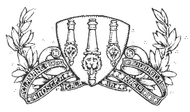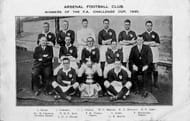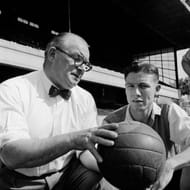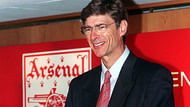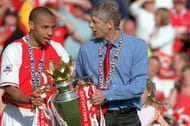“If you do not believe you can do it, then you have no chance at all.” -Arsene Wenger
Valued at more than $1.3 billion, Arsenal is one of the most successful clubs in English Football, having won 13 First Division and Premier League titles along with 10 FA Cups. Arsenal is only the second team to remain unbeaten for a whole season in the 2003-04 campaign.
Arsenal was found in the year 1886 and in 1893 it became the first club from the South of England to join the Football League. Highbury came calling in the year 1913, and the side moved north across the city to Arsenal stadium in Highbury.
Arsenal enjoyed success in the pre-war period by winning five League Championship titles and two FA cups in the 1930s. In the post-war years, Arsenal went through a lean period during this time, but soon found their rhythm and won the League and FA cup double, in the 1970-71 season. In the 1990s and the first decade of the 21st century, Arsenal won two more doubles and reached the finals of the 2006 UEFA Champions League.
Where it all began
The foundations of Arsenal dates back to the year 1886, Arsenal were found as Dial Square by a group of workers employed by Dial Square workshop at the Royal Arsenal in Woolwich. The club was renamed to Royal Arsenal shortly afterwards. In the year 1893, the name was changed to Woolwich Arsenal after becoming a limited company.
The club started out in Second Division in the year 1883 and won promotion to the First Division in 1904. Due to low turnout in the stands, the club faced bankruptcy in 1910, and the club was taken over by businessmen William Hall and Henry Norris.
In the year 1913, after Arsenal faced relegation to Second Division, they moved to the new Arsenal stadium in Highbury, North London and dropped ‘Woolwich’ from the name in the following year. Arsenal could only manage to finish 5th in the second division during the last pre-war season in 1914-15. But rejoined the First Division after the competitive football resumed in 1919-20.
Arsenal was revolutionised after the appointment of Herbert Chapman as manager in the year 1925. Chapman’s tactics and training along with the signing of star players such as Cliff Bastin and Alex James, laid foundations for Arsenals domination in the English football in 1930s. Under Herbert Chapman, Arsenal won its first major trophy victory in the 1930 FA Cup final.
In addition to these contributions, in 1932, Chapman was instrumental in renaming a local London underground station “Gillespie Road” to “Arsenal”, making it the only tube station to be named after a football club.
In the year 1934, Chapman died due to Pneumonia. Joe Shaw and George Allison carried on his work. Under their guidance, Arsenal won three more titles, in 1933-34, 1934-35 and 1937-38 and also the 1936 FA Cup. By now, Arsenal was known as the “Bank of England club.” Key players retired, and the effect was seen in Arsenal’s performances which went down through the end of that decade. The Second World War intervened and competitive football in England was suspended.
Post Second World War Era
After the end of the Second World War, Arsenal enjoyed success under Tom Whittaker, who was Allison’s successor by winning the league twice in 1947-48 and 1952-53, and also won the FA Cup in 1950.
But their fortunes waned soon. Arsenal found it difficult to attract players of the same calibre as they had in the 1930s. And the club went trophyless for most part of the 1950s and 1960s. Billy Wright, former England captain was appointed manager in the year 1962, and he served till 1966. But even he could not bring back the glory days.
A lot of eye brows were raised when club physiotherapist Bertin Mee was appointed manager in the year 1966. And surprisingly Arsenal started winning silverware under his guidance, after losing two League cup finals, Arsenal won the 1969-70 Inter-Cities Fairs Cup, their first even European trophy. And the success didn’t end there, Arsenal went on to register an even greater triumph by winning the League Cup and FA Cup double in 1970-71. However, Arsenal could only manage to finish runners-up in the 1972 FA Cup and First Division runners-up in 1972-73.
At the age of 34, Terry Neill became Arsenal’s youngest manager till date, when he replaced Bertin Mee in the year 1976. Under new signings like Malcolm Macdonald and Pat Jennings, and a crop of talent in the side such as Liam Brady and Frank Stapleton, the club enjoyed their best form since the 1971 double by reaching a trio of FA Cup finals in 1978, 1979, 1980, and losing the 1980 Cup Winners Cup final on penalties.
The club produced a classic match during this time, the FA Cup final win over Manchester United in 1979. Sunderland scored a last minute goal to give Arsenal a 3-2 win.
George Graham, former player was appointed as manager in 1986 and Arsenal enjoyed another spell of success. Arsenal won the League Cup in 1986-87. The 1988-89 League title was won by Arsenal through a last minute goal in the final game of the season against fellow title contenders Liverpool. Arsenal won another title in 1990-91 losing only once, and won the FA Cup and the League cup double in 1993. The club then went on to win their second European trophy, the Cup Winners Cup in 1994.
However, in the following year, George Graham’s reputation took a beating when he was found to have taken kickbacks from agent Rune Hauge to sign certain players. Graham was dismissed in 1995 and was replaced by Bruce Rioch, who lasted only one season and left following disputes with the board of directors.The appointment of Arsene Wenger and success
Arsene Wenger was appointed as manager in the year 1996, and this particular appointment played a crucial role in Arsenal’s success in the late 1990s.
Arsene Wenger brought along, new tactics, training methods and several foreign players who complemented the existing English player’s style of play. Arsenal won their second League and Cup double in 1997-98, and a third in 2001-02. In addition to these, the club lost to Galatasaray on penalties in the 1999-2000 UEFA Cup.
Arsenal were victorious in the 2003 and 2005 FA Cup, and also won the Premier League in 2003-04 without losing a single match, this feat earned Arsenal the nickname “The Invincibles.” The 49 game unbeaten streak extended from 7 May 2003 to 24 October 2004.
In Arsene’s first eleven seasons at the club, Arsenal finished in either first or second place eight times. Until 2005-06, Arsenal never progressed beyond the quarterfinal stage of the competition.
In that season, Arsenal became the first club from London, in the competitions fifty-year history to reach the final. However, they were beaten in the final 2-1 by Barcelona.
After 93 years at Highbury, Arsenal moved to the Emirates stadium in the year 2006. Arsenal has not won any trophy since 2005; they came close to winning a trophy twice when they lost in the League Cup finals in 2007 and 2011 to Chelsea and Birmingham City respectively.
The fans
Arsenal fans are often referred as “The Gooners”, the name derived from the team’s nickname “The Gunners”. Arsenal enjoys a large loyal fan base, who turn out for almost all Arsenal matches, and results in a full stadium for most of the Home matches. In 1997-98, Arsenal recorded the second highest average League Attendance for an English Club. The stadium was filled with 60,070 people, about 99.5% of available capacity.
The club supporters also publish fanzines such as The Gooner, Highbury High, and Gunflash among others. A 2005 report by Granada Ventures, which at the time owned a 9.9% stake in the club, estimated Arsenal’s global fanbase at 27 million.
Arsenal’s longest running rivalry is with their nearest major neighbours, Tottenham Hotspur. The matches between these two sides are referred to as North London derbies. Other rivalries within London include those with Chelsea, Fulham and West Ham United. However, Arsenal and Manchester United developed strong on-pitch rivalry in the late 1980s, which intensified in recent years when both clubs were competing for the Premier League title.
Straight from a Gooner’s heart
It has always been a pleasure watching Arsenal play. Over the years, Arsenal has grown as a team. Despite the injuries the players faced, Arsene Wenger put his trust in all players, who have undoubtedly repaid his faith and confidence in them, and it has been pretty evident this season.
All Arsenal fans will certainly echo my view when I say this:
We are loyal when we lose, We are proud when we win, We are Gooners till we die!
